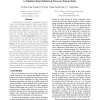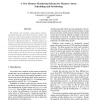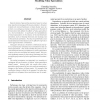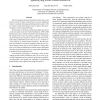99
Voted
HPCA
2001
IEEE
16 years 2 months ago
2001
IEEE
A new memory subsystem called Memory Expansion Technology (MXT) has been built for compressing main memory contents. MXT effectively doubles the physically available memory. This ...
125
Voted
HPCA
2002
IEEE
16 years 2 months ago
2002
IEEE
Cache memories account for a significant fraction of a chip's overall energy dissipation. Recent research advocates using "resizable" caches to exploit cache requir...
104
Voted
HPCA
2002
IEEE
16 years 2 months ago
2002
IEEE
This work is based on our philosophy of providing interlayer system-level power awareness in computing systems [26, 27]. Here, we couple this approach with our vision of multipart...
104
Voted
HPCA
2002
IEEE
16 years 2 months ago
2002
IEEE
We propose a low overhead, on-line memory monitoring scheme utilizing a set of novel hardware counters. The counters act like pressure gauges indicating the marginal gain in the n...
121
Voted
HPCA
2002
IEEE
16 years 2 months ago
2002
IEEE
Thread-Level Speculation (TLS) allows us to automatically parallelize general-purpose programs by supporting parallel execution of threads that might not actually be independent. ...
90
Voted
HPCA
2002
IEEE
16 years 2 months ago
2002
IEEE
Several studies of speculative execution based on values have reported promising performance potential. However, virtually all microarchitectures in these studies were described i...
113
Voted
HPCA
2002
IEEE
16 years 2 months ago
2002
IEEE
This paper advocates that cache coherence protocols use a bandwidth adaptive approach to adjust to varied system configurations (e.g., number of processors) and workload behaviors...
125
Voted
HPCA
2002
IEEE
16 years 2 months ago
2002
IEEE
The increasing performance gap between processors and memory will force future architectures to devote significant resources towards removing and hiding memory latency. The two ma...
98
Voted
HPCA
2002
IEEE
16 years 2 months ago
2002
IEEE
103
Voted
HPCA
2002
IEEE
16 years 2 months ago
2002
IEEE
This paper explores the role of branch predictor organization in power/energy/performance tradeoffs for processor design. We find that as a general rule, to reduce overall energy ...




